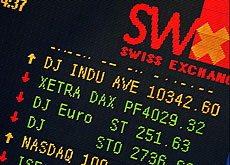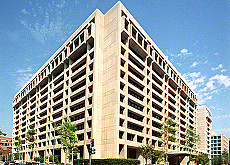New financial watchdog gets green light

Parliament has approved plans for a new regulator to boost the image of Switzerland's financial workplace by combining the activities of three existing watchdogs.
But the Federal Financial Market Supervisory Authority (Finma) will be delayed for a year and has been criticised in some quarters for lacking full autonomy from government.
Finma will finally group together the regulatory work of the Federal Banking Commission, the Federal Office of Private Insurance and the Money Laundering Control Authority at the beginning of 2009, following years of political wrangling.
It will investigate suspected cases of money laundering and corruption to help Switzerland finally shake off its old reputation as a soft touch for criminal money.
Switzerland has already received praise from the international community for taking strides to clean up its financial centres with strict laws and regulatory bodies.
The International Monetary Fund broadly welcomed the plans this month but voiced criticism that the Swiss finance ministry will retain full powers to impose financial penalties, fearing this may compromise Finma’s independence.
Swiss finance ministry spokesman Dieter Leutwyler rejected the criticism, saying that Finma’s powers of confiscation, issuing bans and naming and shaming gave it enough teeth to operate effectively.
Power separation
“We do not share the concerns of the IMF in the field of independence, sanctions and costs of regulation,” he told swissinfo.
“The independence of Finma is an important prerequisite for it to be able to fulfil its supervisory duties.”
Professor Hans Geiger of Zurich University’s Swiss Banking Institute told swissinfo that it was important to separate the powers of investigation and punishment.
“There is legal argument that the supervisor should not also act as the judge, so this separation of functions is absolutely necessary.
“The Banking Commission today has significant powers and nearly all of its recommendations are enforced. There is no reason to think this will change for Finma.”
And Geiger revealed himself to be no fan of Finma despite the Banking Commission calling its creation “absolutely necessary”.

More
Money laundering
Efficiency fears
Geiger believes bringing regulation of the banking and insurance sectors under one roof may cause confusion as the two areas are so different. He also added that regulatory reputation was created by the actions of watchdogs and not by reshuffling departments.
“There is a saying that if it ain’t broke then don’t fix it and I strongly believe in that. Regulation works very well in Switzerland so why change it?” he said.
“It would be better to bring the three existing bodies together in one building so that its staff can exchange ideas during coffee breaks.
“Finma will probably be more expensive, less efficient and less effective than the current regime. It will not be able to improve anything and can only make it worse.”
swissinfo, Matthew Allen

More
Federal Banking Commission
Switzerland is a signatory of the Organisation for Economic Co-operation and Development’s (OECD) Financial Action Task Force, the main forum against criminal money flows.
Transparency International says that international cooperation has helped in Switzerland’s fight against money laundering, but the country’s financial authorities still have “some way to go”.
It said last year that a recent OECD report recommended Switzerland strengthen its money laundering surveillance, specifically calling for greater transparency, the independence of the financial intermediaries and a tighter deadline for reporting suspicious transactions.
Money laundering involves concealing the origins of money earned through criminal activities and releasing it unnoticed into legitimate business activities.
Switzerland introduced the criminal offence of money laundering to its penal code in 1990.
The Money Laundering Act of 1998 imposed a requirement for all financial intermediaries – not only banks – to report suspicious transactions.
Parliament also approved proposals to tighten up laws on company takeovers. It follows an outcry over foreign equity firms buying up Swiss companies, like Saurer and Sulzer, by stealth.
The new rules, that come into force on July 1, compel buyers to declare when they have acquired 3% of a target’s shares – down from the previous limit of 5%.
It also closes a controversial loophole that allowed buyers to acquire any number of cash settlement options – contracts that can be exchanged for cash or shares – without having to reveal their hand. These are now lumped together with shares and other options.
Austrian private equity group Victory and Renova, woned by Russian billionaire Viktor Vekselberg, had been taking advantage of the loophole to launch ambush takeovers in the past two years.

In compliance with the JTI standards
More: SWI swissinfo.ch certified by the Journalism Trust Initiative












You can find an overview of ongoing debates with our journalists here . Please join us!
If you want to start a conversation about a topic raised in this article or want to report factual errors, email us at english@swissinfo.ch.